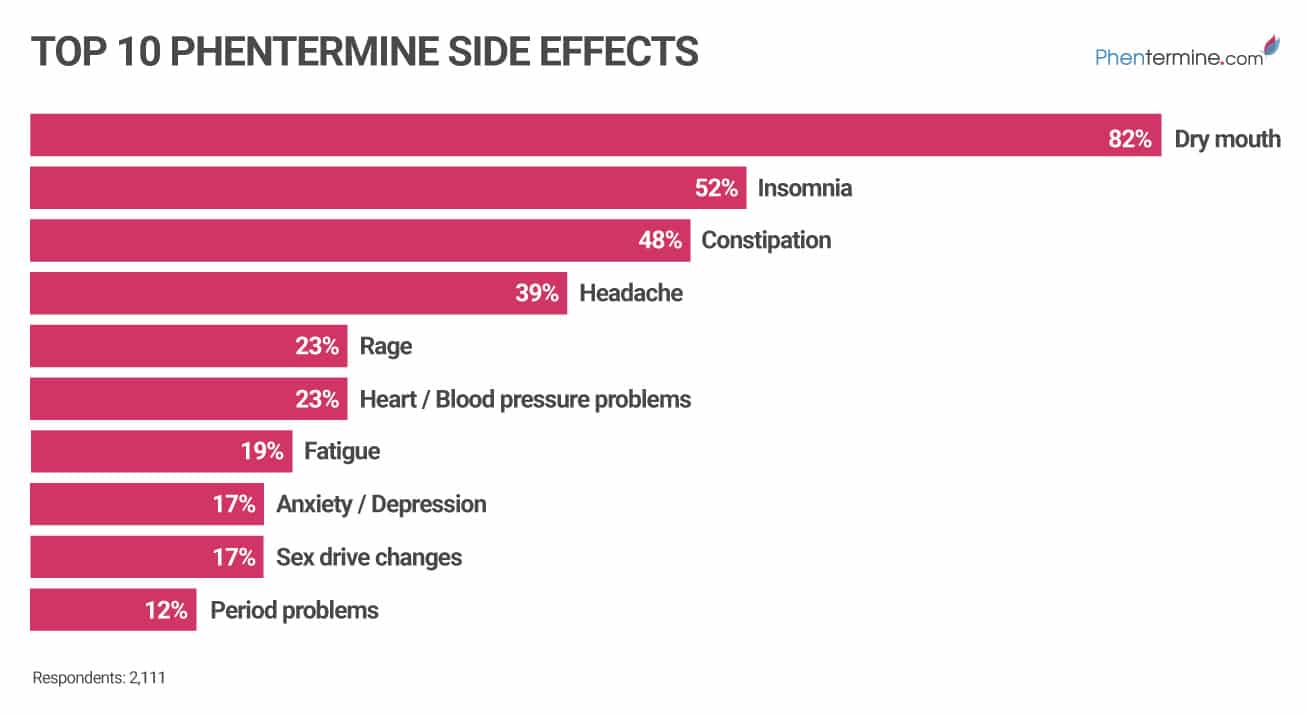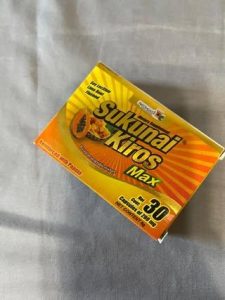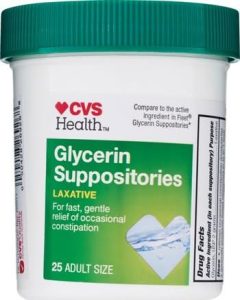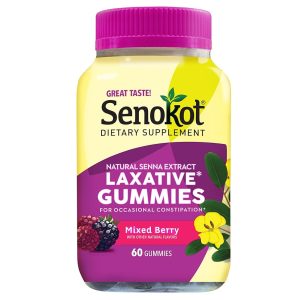Phentermine Constipation: Causes & Relief Tips
Medically reviewed by Dr. Marcus Goodman on September 16, 2025.
Phentermine, a commonly prescribed weight loss medication to suppress appetite, can have the unwanted side effect of constipation. In this article, we will examine the causes of phentermine-induced constipation and offer practical solutions to alleviate this discomfort.
So, can phentermine cause constipation? Yes, phentermine can cause constipation as a side effect due to its impact on slowing digestion.
Too busy for the full read? Here’s what you need to know:
Does Phentermine Cause Constipation?

Yes, constipation is one of the most common side effects of phentermine.
A recent online poll by Phentermine.com confirmed that many patients experience phentermine constipation. In fact, almost 50% of phentermine users report constipation while using the medication, right after the two most reported phentermine side effects, insomnia and dry mouth (

Thankfully, most cases of phentermine constipation resolve within a few days without medical intervention.
However, if your bowel movements are irregular, infrequent, or hard to pass for more than a couple of days while taking phentermine, contact your prescribing doctor.
Why Does Phentermine Cause Constipation?
Phentermine is known to cause constipation due to its effects on slowing digestion. The slow transit of food through the digestive system results in excessive water absorption from the stool. This leads to hard, dry stools that are difficult to pass.
Let’s look at the causes in greater detail:
CNS Stimulation

Phentermine stimulates the central nervous system. This causes a release of neurotransmitters that increase energy and suppress appetite. Unfortunately, these same chemicals can also cause unwanted side effects like constipation.
As part of the “fight or flight” response that produces a reduction in appetite, the brain also signals the body to divert resources away from active digestion, which slows peristalsis: muscle contractions that move food through the digestive tract (
When digestion is slowed for too long, it can cause constipation. This is why many phentermine users complain of problems passing stool.
Inadequate fluid intake may also contribute to phentermine constipation, in addition to exacerbating phentermine dry mouth and headaches. Stimulants can cause dehydration, and if there is not enough water in the body available to help expel waste products through stools, which are typically 75% water, it may cause constipation (
Dietary & Emotional Changes

Constipation can also be a result of changes in routine, stress, depression, or anxiety.
This medication is a strong appetite suppressant, so people tend to eat significantly less while taking it. Decreased food intake can slow digestion and produce this uncomfortable side effect (
Phentermine constipation is especially common in patients whose diets limit the intake of certain food groups. For example, low-carb diets (like carnivore and keto) pose a particular threat, given followers’ tendency to dramatically decrease the intake of fiber-rich foods like whole grains and produce.
Stress, depression, and anxiety can also cause or worsen constipation (
How to Manage Phentermine Constipation?
Going a day or two without a bowel movement might have you reaching for the laxatives, but consider a natural phentermine constipation remedy before you run to the drug store. Many behaviors that naturally help relieve phentermine constipation boost weight loss as well.
Here are six practical and effective ways to stop constipation from phentermine:
1. Hydration: Increase water intake
The most straightforward phentermine constipation remedy is to increase fluid intake.
Your organs need water to function correctly, and the digestive system is no exception. When there is insufficient water, the body pulls fluid from the stool, making feces dry and hard to pass. To minimize dehydration, try to drink at least eight glasses (two liters) of water or other calorie-free, caffeine-free beverages each day.
Avoid dehydrating drinks such as coffee, colas, energy drinks, and alcohol.
If you’re already drinking plenty of water, try adding a glass of warm water with lemon in the morning. Warm water increases the intestines’ tightening, facilitating bowel movements. The lemon helps as its high acid content stimulates the digestive system to get things moving (

2. Diet: High-fiber foods
There are two types of dietary fiber, and both help to treat and prevent constipation. Soluble fiber helps decrease cholesterol levels and makes stools easier to pass, while insoluble fiber helps promote regular bowel movements (
Adult women need 25 grams of fiber per day. In comparison, men require an average of 38 grams (
To combat phentermine-induced constipation, incorporate more fiber-rich foods into your diet, such as whole fruits and vegetables with edible skins, whole grains, and legumes (e.g., lentils, beans, or peas).
A tip: Prunes, or dried plums, are rich in insoluble fiber and contain sorbitol, which is a natural laxative. In a 2018 study, subjects experienced significant increases in both stool frequency and stool weight after consuming 80-120 grams of prunes per day (
NOTE: Eating more fiber can worsen constipation if you’re not getting enough fluids. So, as you increase fiber intake, make sure to drink plenty of water as well.
3. Physical Activity: Regular exercise
Regular physical activity increases blood flow to the intestines and promotes keeping your abdominal muscles in shape. Both help keep stool moving.
So, make exercise a part of your daily routine. Aerobic exercises like walking, running, swimming, or cycling provides the most benefit, but even a little gentle stretching or yoga can help (
4. Medication Adjustment
Seek guidance from your healthcare provider. This consultation could involve discussing the possibility of modifying the phentermine dosage to alleviate the discomfort.
Furthermore, healthcare professionals might suggest the temporary use of stool softeners or over-the-counter laxatives to manage symptoms as adjustments to the appetite suppressant regimen are implemented under medical supervision.
5. Stress Management
Stress, depression, and anxiety worsen constipation, and phentermine is known to exacerbate these negative emotions, so effective stress management is critical for both weight loss and phentermine constipation relief.
Reduce stress with yoga, meditation, deep breathing, doodling, reading a book, or talking to a friend.
6. OTC Medications
Several over-the-counter (OTC) remedies are available for treating different stomach issues.
You can use docusate sodium (Colace) or polyethylene glycol (Miralax) for constipation. Loperamide (Imodium A-D) can be a suitable option for treating diarrhea.
However, if your stomach problems persist even after a few days of using these OTC medications, you should inform your healthcare provider.
Patient Stories On How to Deal With Constipation
If you are experiencing any constipation or headaches, you are not drinking enough water. You also may need 3 capsules of Magnesium Citramate before bed for constipation.
Darbyann S.
Mag07, go-go fiber chews ,and a few prunes. That my routine. Works great! I take 2 mag07 every night.
Kyla Marie H.
Try eating a full lemon. It’s a natural laxative. It may be sour but it worked for me!!
Danielle D. C.
Milk of magnesia or smooth move tea. Constipation and diarrhea are real on this. Make sure you are drinking enough water. Half your body weight in ounces a day is preferred.
BrookE V.
MagO7 or dulcolax laxative tablets (not the stool softener) will get things moving.
Evelyn r.
I have 1 coffee a day and it moves things along within the hour 😳.
Jamie Nichole C.
2 Glass of prune juice and you’ll be running to bathroom in 20 min!
Mary Ellen P. S.
Action Plan for Phentermine Constipation Based on User Experiences
This is based on shared experiences. Always check with your doctor before starting new supplements or medications, especially if you have other health conditions.
1. Prevention & Daily Habits
- Aim for at least half your body weight in ounces of water daily
- Get more fiber from food: Whole grains, leafy greens (spinach, kale), beans, apples, pears, quinoa, brown rice, salads.
- Take probiotics: Capsule, probiotic tea, or yogurt
- Add chia seeds/flaxseed to smoothies or shakes
- Walk daily (10–15k steps helps many)
- Morning trigger: Coffee or green tea (stimulates bowels)
2. If Still Constipated After 1–2 Days: Gentle Supplements
- Stool softeners (Colace twice daily)
- Fiber supplements (Benefiber, Metamucil, Fiber One, psyllium husk)
- Magnesium:
- Mag07 (very popular; take at night, start with 1–2 pills)
- Magnesium citrate capsules (gentler for ongoing use)
3. If Blocked for 2-3+ Days: Stronger OTC Options
- Miralax (polyethylene glycol) daily or as needed (mix in water or Gatorade).
- Milk of Magnesia: works within hours.
- Stimulant laxatives such as Ex-Lax (senna chocolate squares), Dulcolax tablets, Smooth Move tea (senna-based), or herbal teas (Slim tea, ballerina tea, Piña Lim tea).
While there are immediate relief options for severe and painful constipation, such as glycerin or bisacodyl suppositories, Fleet enemas, or manual disimpaction using gloves and lubrication, it is strongly advised to consult a doctor for further guidance.
If you experience any blood, severe pain, or signs of impaction, you should contact your doctor for a medical evaluation.
User-Recommended Over-the-Counter Remedies for Constipation
Patients recommend the following OTC products for phentermine constipation.
Note: We are not affiliated with any of the mentioned companies, nor do we endorse them.
nbpure Mag07

Sukunai Kiros Max

Nature Made Magnesium Citrate Gummies

Glycerin Suppositories

Senokot Laxative Gummies

Summary
Phentermine constipation is a common side effect of the medication as it suppresses appetite, which can lead to reduced food and fluid intake, slowing down digestion.
Symptoms of constipation include infrequent bowel movements, hard stools, and bloating.
To manage constipation, patients should increase their water intake, consume fiber-rich foods, stay physically active, and consider using fiber supplements or mild stool softeners if needed.
While constipation often improves as the body adjusts to phentermine, severe or persistent cases should be discussed with a healthcare provider. In most instances, constipation alone does not necessitate discontinuing phentermine, but it is important to seek medical guidance for safe treatment.
Frequently Asked Questions
How can I relieve constipation while on phentermine?
Drink more water, eat fiber-rich foods, and stay active. If necessary, stool softeners or fiber supplements can also help.
How long does phentermine constipation last?
It usually improves within a few days to weeks as your body adjusts, though some people may experience it longer.
Should I stop taking phentermine if I’m constipated?
Mild constipation alone typically isn’t a reason to stop; however, consult your doctor if the symptoms persist or become severe.
Can I Take a Laxative with Phentermine?

ALWAYS check with your doctor and pharmacist before taking any additional medications or supplements alongside phentermine.
Some people take a laxative with phentermine to help relieve mild, short-term constipation. However, these medications are not safe for everyone, and they act quickly, so do not use laxatives and phentermine together without talking to your doctor & pharmacist first.
- Mayo Clinic Staff. (2018, January 10). Constipation.
- Members of “Losing Weight with Phentermine” Support Group on Facebook & Phentermine.com Forum. (2019, March 13). [User Report of Common Phentermine Side Effects]. Unpublished raw data
- National Health Service. (2017, December 20). Constipation.
- Silverthorn, D. U. (2009). Human physiology: An integrated approach (4th ed.). Harlow: Pearson Education.
- Martin, E. B., Jr., & Hammerness, P. G. (2014, August). Thirsty: ADHD, Stimulant Medication, and Dehydration. Attention, 26-27.
- The Editors of Encyclopaedia Britannica. (2002, June 14). Feces. In Encyclopaedia Britannica.
- Towers, A. L., Burgio, K. L., Locher, J. L., Merkel, I. S., Safaeian, M., & Wald, A. (1994). Constipation in the elderly: Influence of dietary, psychological, and physiological factors. Journal of the American Geriatrics Society, 42(7), 701-706. doi:10.1111/j.1532-5415.1994.tb06527
- Baucom, M. (2017, April 3). Do This and That: Taking Proven Chronic Constipation Remedies to the Next Level (E. K. Luo MD, Ed.).
- UCSF Medical Center. (n.d.). Increasing Fiber Intake.
- Dahl, W. J., & Stewart, M. L. (2015). Position of the Academy of Nutrition and Dietetics: Health Implications of Dietary Fiber. Journal of the Academy of Nutrition and Dietetics, 115(11), 1861-1870. doi:10.1016/j.jand.2015.09.003
- Smith, M. W. (Ed.). (2018, June 25). Exercise for Constipation Relief: Which Exercises to Do.
- Lever, E., Scott, S. M., Louis, P., Emery, P. W., & Whelan, K. (2018). The effect of prunes on stool output, gut transit time and gastrointestinal microbiota: A randomised controlled trial. Clinical Nutrition. doi:10.1016/j.clnu.2018.01.003

